Dentures vs. Dental implants: Which is right for you?
Choose confidently between dentures and implants with our expert advice tailored to your dental needs and comfort.
In the intricate world of tooth replacements, choosing between dentures and implants is a journey of contrasts.
As we sip our morning coffee and ponder these choices, it's clear: both paths lead to the same destination—a radiant, confident smile. But the journey? It's uniquely personal, and up to you and your clinician to figure out which path is right for you.
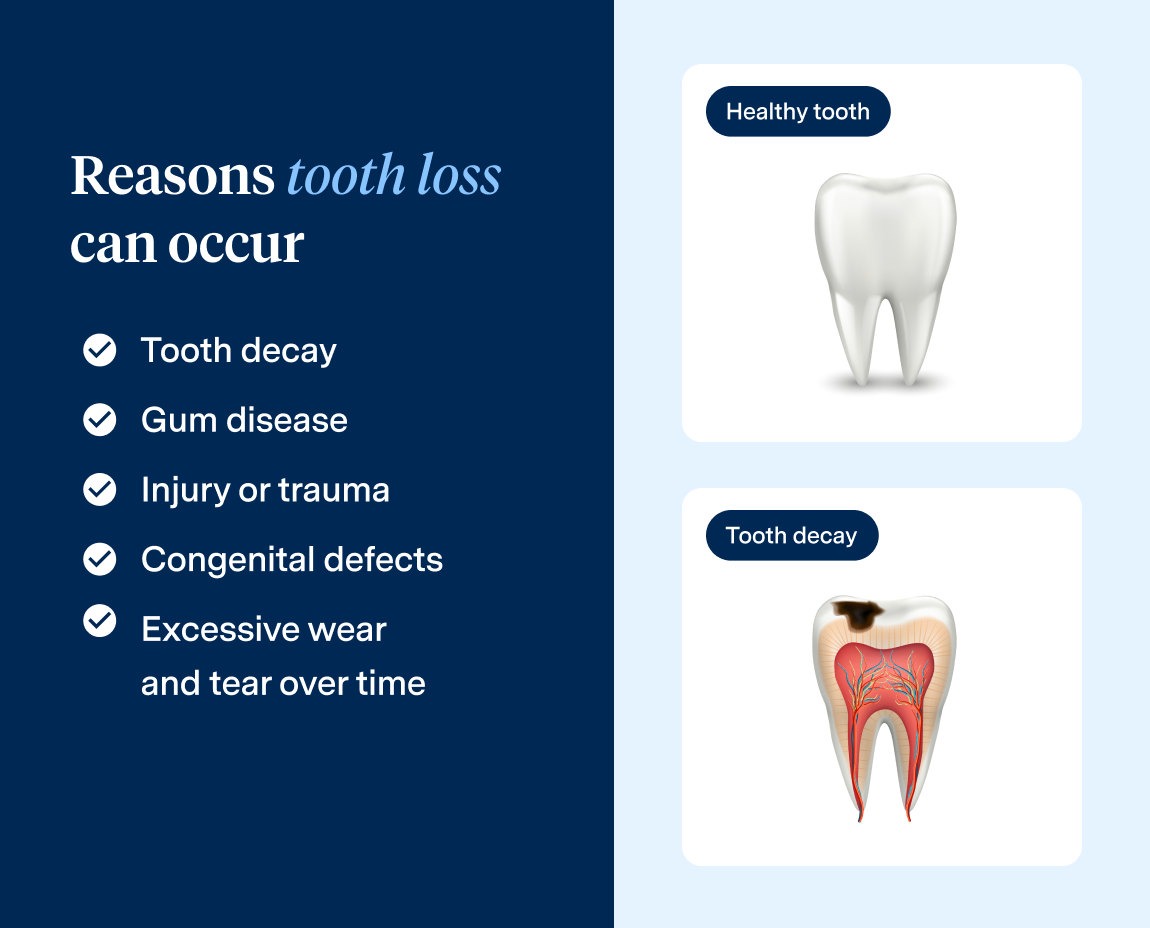
Understanding tooth loss and its impact
Before jumping into the specifics of each of these smile solutions, it’s important to understand how impactful tooth loss can be to someone.
Tooth loss can impact more than just your oral health and loss of function. Losing teeth makes daily activities like eating and speaking challenging. Beyond this, shame and confidence issues that stem from tooth loss can creep up on you and before you know it, you’re changing your diet, minimizing your social time, and even smiling less.
Beyond these factors, many people may even experience dental anxiety due to stigma and fear related to going to the dentist. Recognizing these impacts highlights the importance of finding the right dental solution for you, and Aspen Dental is here to guide you every step of the way.
Tooth loss can occur due to a variety of reasons, including:
Dental disease (tooth decay, gum disease)
Injury or trauma
Congenital defects
Excessive wear and tear over time
Regardless of the cause, tooth loss can have far-reaching consequences beyond just affecting your smile's appearance.
Missing teeth can lead to:
Difficulty chewing and eating properly, potentially impacting nutrition
Jawbone deterioration and facial shrinking due to lack of bone stimulation
Shifting of remaining teeth, causing bite misalignment
Speech difficulties and reduced confidence in social situations
Addressing tooth loss effectively is crucial for maintaining your oral health, preserving your ability to eat and speak comfortably, and avoiding further dental complications down the line.
Tooth replacement options
When faced with the prospect of replacing missing teeth, a variety of options exist to restore both function and aesthetics. From bridges and partial dentures to traditional dentures, state-of-the-art dental implants and implant dentures, each solution offers its own set of advantages and considerations.
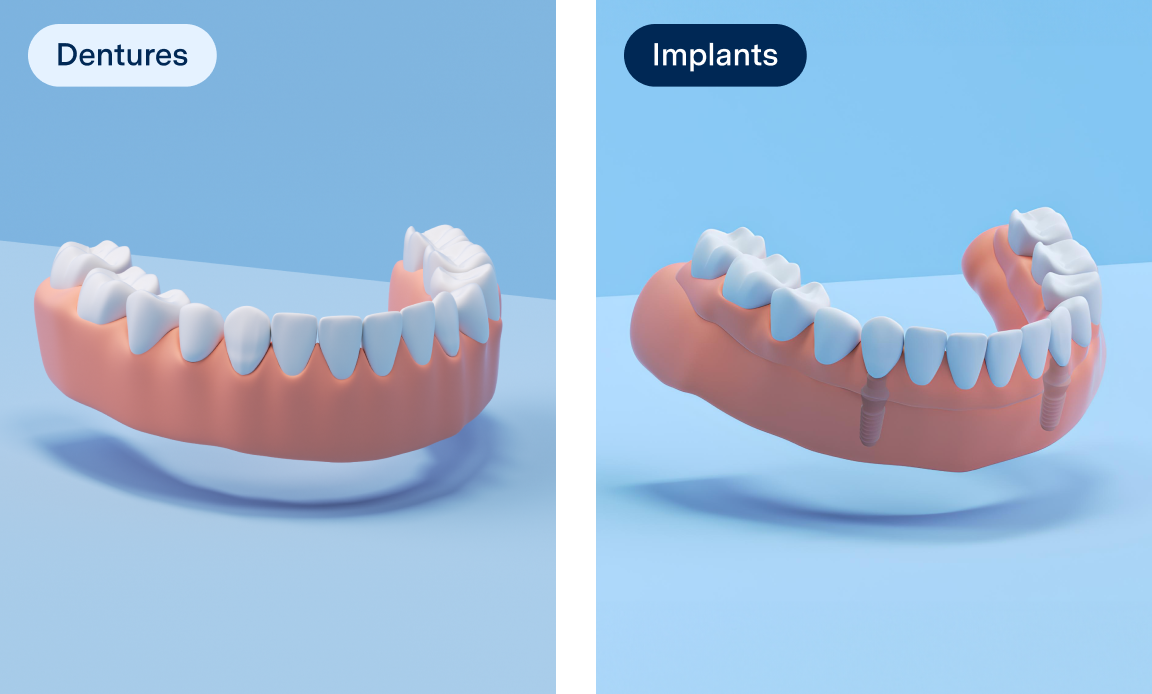
What’s the difference between dentures and dental implants?
Two of the most popular solutions for tooth replacement are dentures and dental implants. Both have proven to be impactful on people’s lives. However, despite both being great solutions to this issue, each has their own unique characteristics and advantages.
Dentures
Dentures are removable dental appliances that cover the tissue surrounding missing teeth. They fit snugly over your gums, restoring the appearance and function of your smile, securely.
Dentures come in two main types:
Full dentures replace all your teeth in an arch, creating a full set of artificial teeth for your upper or lower jaw.
Partial dentures replace some missing teeth while clasping around your surrounding, remaining natural teeth for support.
Dental implants
Dental implants, on the other hand, are considered the best long-term solution for tooth replacement. They are artificial tooth roots made of titanium that are surgically inserted into the jawbone.
In a matter of a few months, the jawbone integrates with the implant through a process called osseointegration, creating a stable foundation for the attachment of dental prosthetics such as crowns, bridges, or dentures.
This integration ensures not only a secure fit for the dental prosthetic, but also helps to maintain the integrity of the jawbone, helping prevent deterioration and preserving facial structure. With proper care, dental implants can last a lifetime, providing unparalleled stability and functionality for a confident smile.
Implants are designed to be a permanent solution, mimicking the look, feel, and function of natural teeth. They empower you to be able to eat and taste the foods you love, speak and smile comfortably, and have confidence.
The primary differences between dentures and dental implants lie in their composition, permanence, and the procedures involved in obtaining them.
Composition and function of dentures and dental implants
While both dentures and dental implants serve the purpose of replacing missing teeth, they differ significantly in terms of their composition, use and function.
Dentures
Composition
Dentures are made from high-quality base and tooth materials, designed to mimic the appearance of natural teeth and gum tissue.
Function
The main function of dentures is to restore your ability to eat, speak, and smile comfortably after tooth loss. However, they do not integrate with your jawbone and may become loose over time, potentially causing discomfort. They are recommended, by the American Dental Association (ADA), to be replaced every 5-7 years.
Dental implants
Composition
Implants consist of a titanium post (the implant) that is surgically inserted into the jawbone, a connector (abutment) that attaches to the implant post, and a custom-made crown, bridge, or denture that attaches to the abutment.
Function
Dental implants are designed to last a lifetime and mimic the look, feel, and function of natural teeth. Once integrated with the jawbone, they provide a stable and secure foundation for biting and chewing, allowing you to eat and speak with confidence.
Both dentures and implants serve the purpose of replacing missing teeth, but the procedures, preparation, and recovery times differ significantly.
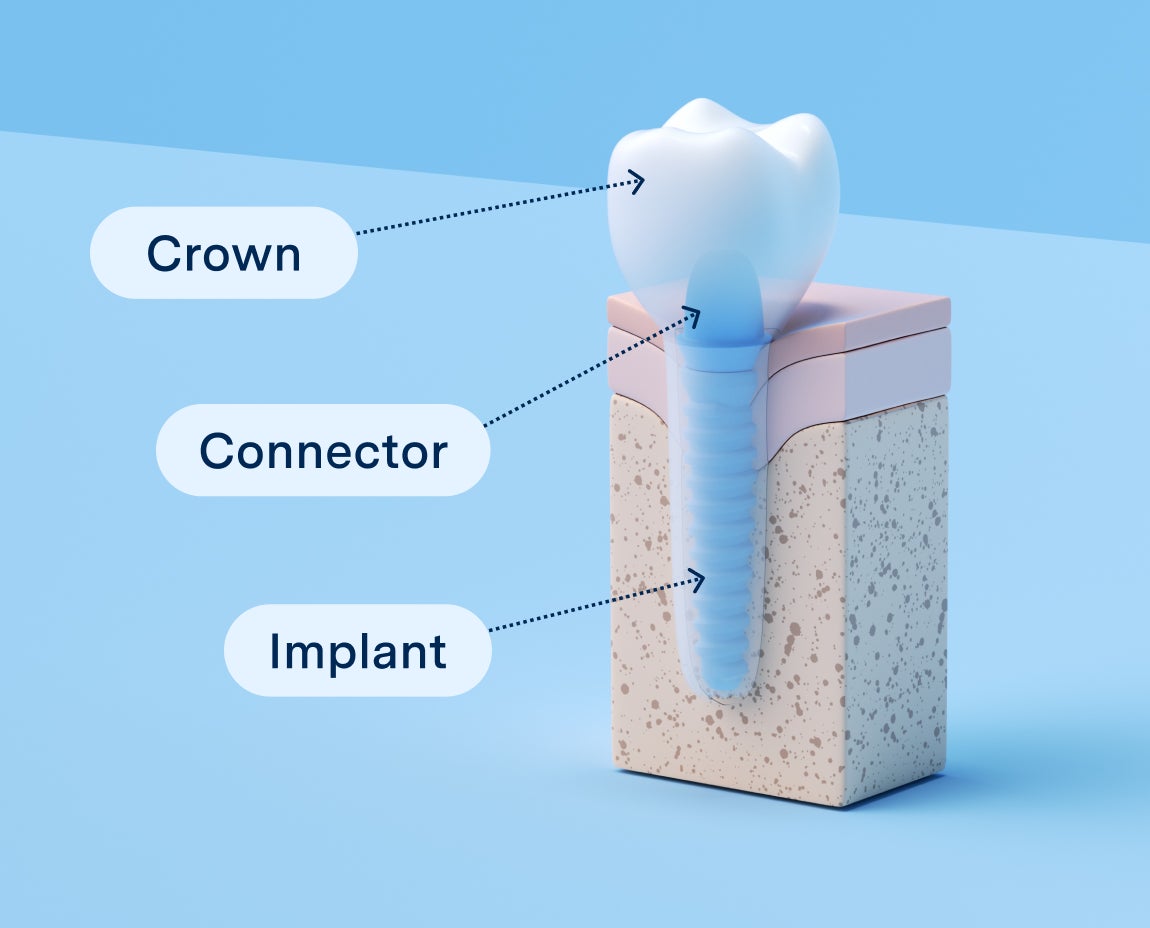
Understanding some pros and cons of dentures and dental implants
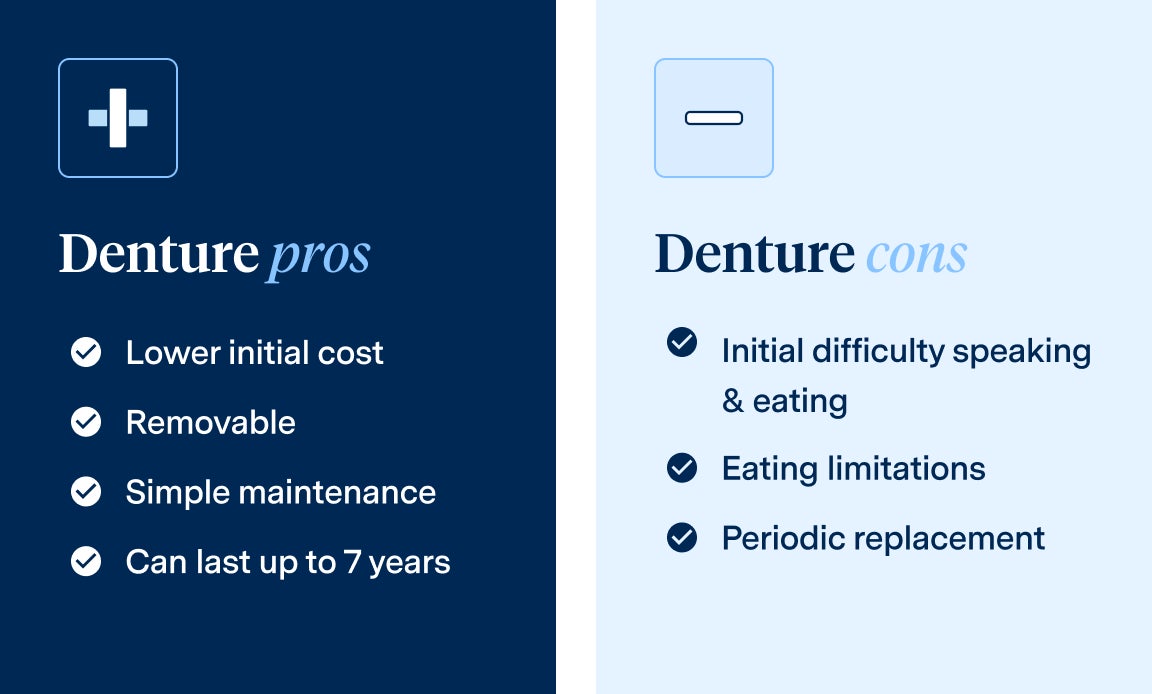
Dentures
Pros
Lower upfront cost, compared to dental implants
Easily removable for cleaning/sleeping
Simple maintenance with regular cleaning routines
Can last up to 7 years with proper care
First step in getting implant therapy, setting you up for future success with implants
Cons
Adjustment period for speaking and eating
Eating limitations (avoid hard/sticky foods)
Require relines/adjustments as mouth changes
Need periodic replacement every 5-7 years
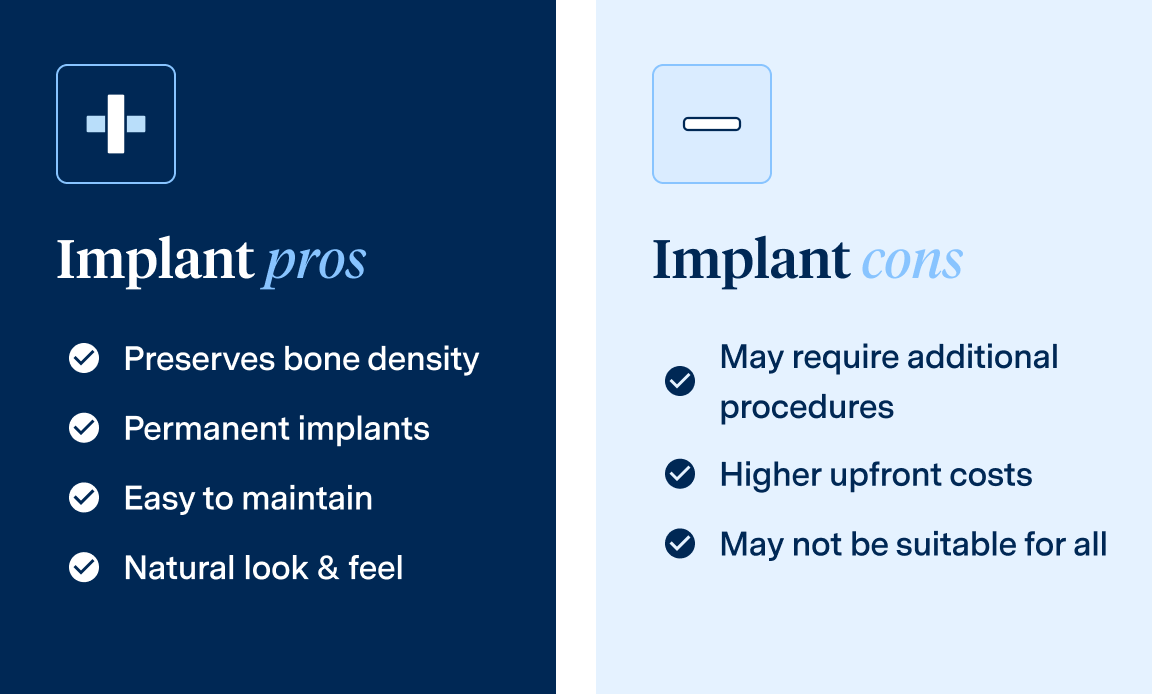
Dental implants
Pros
Preserves jawbone density
Non-removable, permanent implant solution
Easy to maintain
Natural look, feel and function
Longevity
Cons
Potential higher upfront cost, compared to dentures
Not suitable for all due to health or bone density issues
Additional procedures may be required
When considering dentures or implants, the pros and cons relate to factors like cost, permanence, functionality, and maintenance requirements. Dentures are more affordable initially but have eating limitations and should be replaced every 5-7 years with the potential need for relines or adjustments. Implants are an investment but offer a permanent, natural-feeling solution. Working with your dental clinician and discussing your specific needs and priorities can help guide the ideal choice for you.
Qualifying for dentures vs. dental implant treatment: Which is best for me?
Choosing between dentures and dental implants involves a thorough evaluation by a dental professional to determine the best option based on individual needs and circumstances.
Eligibility for dentures
Multiple missing teeth
Suitable for patients missing several or all of their teeth or are needing teeth replaced.
Bone and gum condition
Can be an option for those with bone loss or significant gum issues that preclude implants.
Immediate solution
At Aspen Dental, our care team can provide immediate dentures in a timely manner to our patients.
Budget
Often more affordable upfront than implants.
Eligibility for dental implants
Bone density
Sufficient jawbone density is required to support the implant, which will be evaluated by your clinician.
Overall health
Good overall health is important to ensure proper healing.
Oral health
Healthy gums and no active periodontal disease are essential. Your clinician will work with you to ensure you have healthy gums and no active periodontal disease prior to placing implants.
Lifestyle
Non-smokers or those willing to quit, as smoking can impede the healing process and durability of the prosthesis (crown, bridge or denture).
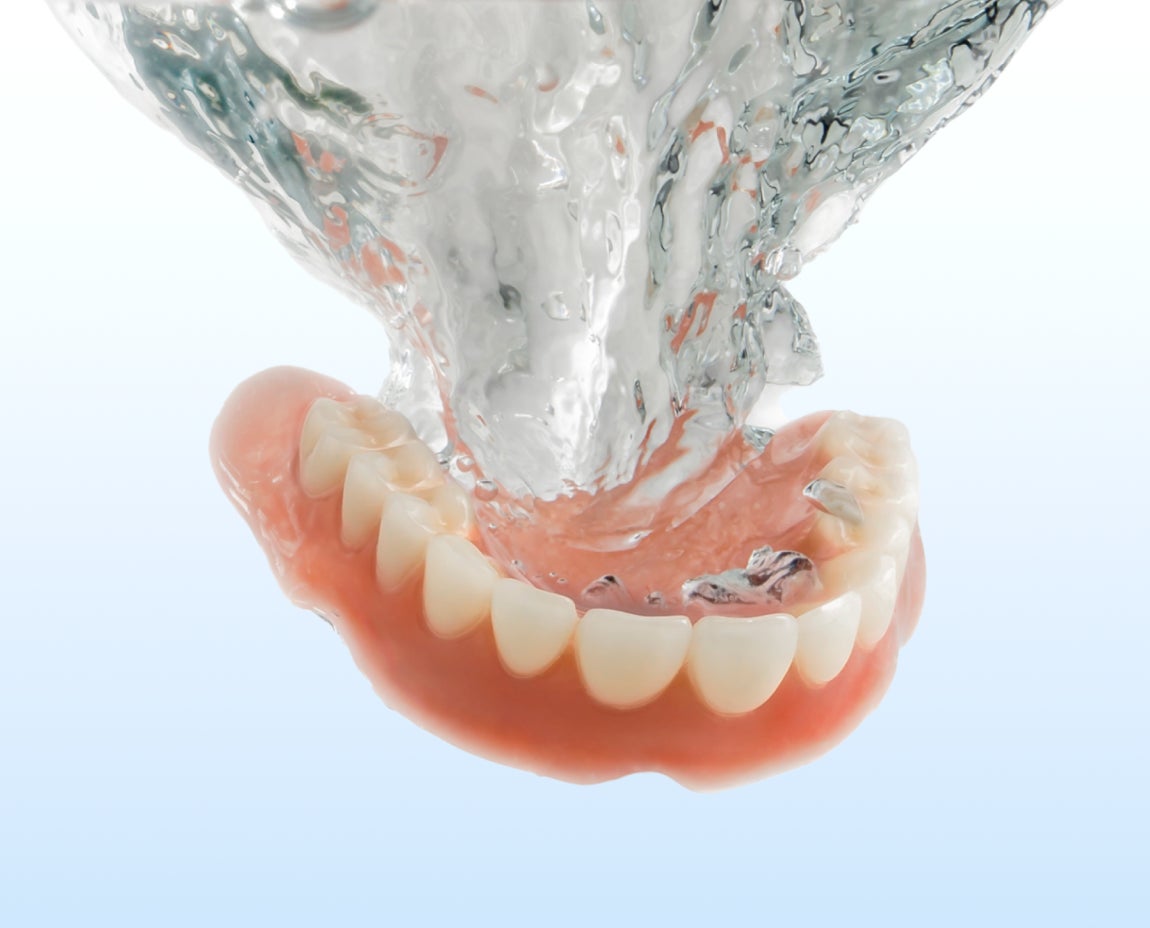
Caring for your new smile: Denture and implant maintenance
Whether you choose dentures or dental implants, taking great care of your new smile is essential for ensuring long-lasting comfort, function and appearance.
Denture wearers
Keeping your dentures clean is key to maintaining a fresh, confident smile and helping issues like bacteria accumulation, staining, bad breath, and gum irritation.
Here are some easy tips:
Make it a daily habit to remove your dentures and give them a gentle brushing with a soft-bristled denture brush and non-abrasive denture cleaner.
Each night, give your dentures a refreshing soak in a denture-cleaning solution.
Before placing your dentures back in, be sure to thoroughly rinse away any cleaning solution residue.
Don't forget to visit your dentist regularly!
Dental implant patients
One of the great benefits of implants is that you can care for them just like your natural teeth! With some consistent TLC, your new implant can last a lifetime.
Here are some easy tips:
Brush twice daily and floss once a day, just as you would for your natural teeth (excluding those with bridges or implant dentures).
Pay special attention when brushing and flossing around the implant fixtures themselves. Removing plaque buildup in these areas is crucial for helping fight against gum disease.
Ditch any habits like smoking or chewing on hard or sticky objects or foods.
Stay on top of your routine dental visits! Your dentist will provide professional cleanings and check the fit of your implants.
Your Aspen Dental care team is also an excellent resource for personalized maintenance tips tailored to your unique tooth replacement needs.

Deciding the right option for you
When it comes to choosing between dentures and dental implants, it's essential to consider not only your current oral health status but also your long-term goals and lifestyle preferences. Here are some additional factors to weigh:
Lifestyle and dietary habits
If you lead an active lifestyle or enjoy a varied diet, implants may be the better choice as they have more stability than dentures, allowing you to eat and speak with ease.
For those wanting a more affordable option and are less worried about having a restricted diet, dentures may be more suitable.
Bone health and density
Implants require sufficient jawbone density for successful integration. If your bone has deteriorated significantly, you may need additional procedures like bone grafting, which can increase overall costs.
Dentures are often a more viable option for those with bone loss, as they don't require the same level of bone density.
Some patients with significant deterioration have a more difficult time wearing dentures due to the lack of stability and retention that are supported by the underlying bone structures. Typically the higher the degree of bone loss the higher the likelihood of instability with wearing dentures, so this is something to also consider.
Commitment to oral hygiene
Implants require diligent oral hygiene practices to improve their longevity and to help prevent complications like peri-implantitis (inflammation around the implant).
Keeping your dentures clean is imperative to avoiding bad breath, gum irritation and infections. Regular cleaning helps make sure they stay in good shape and keeps your mouth healthy.
By carefully considering these factors alongside your dentist's professional recommendations, you can make an informed decision that aligns with your unique circumstances, priorities, and long-term goals.
Dentures vs. implants FAQs
How much do dentures or implants cost?
The cost of dentures or implants can vary depending on factors such as the specific materials used and the complexity of your case. In general, dentures tend to be more affordable upfront, but implants often prove to be a better long-term investment. During your consultation, your dentist can provide you with a detailed breakdown of the costs involved for each option.
Can I get implants if I already have dentures?
Yes, it's possible to transition from traditional dentures to implant-supported dentures. This process involves strategically placing dental implants in your jawbone, which then serve as anchors for your denture, providing a secure and stable fit. Implant-supported dentures offer improved functionality, comfort, and confidence, compared to traditional removable dentures. For those that have dentures, you’re already one step closer to receiving implants, as your teeth have already been extracted.

Your journey to a new smile starts here
At Aspen Dental, we understand that dealing with tooth loss can be an emotional and challenging experience. Restoring your smile is about much more than just replacing missing teeth – it's about regaining your confidence, your ability to fully enjoy the foods you love, and your overall quality of life.
That's why our Aspen Dental care team is committed to guiding you through every step of this journey with care, compassion, and expertise. We’ll take the time to understand your unique needs, answer all your questions, and help make sure you have a thorough understanding of your options.
So if you're ready to take the first step towards restoring your confidence and overall well-being, schedule an appointment at Aspen Dental today.

